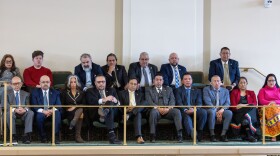With federal food assistance in peril, Oklahoma food banks, nonprofits and religious groups are bracing for impact.
The Supplemental Nutrition Assistance Program, also known as food stamps, could be cut off Saturday for over 680,000 Oklahomans if the federal government shutdown doesn’t end. While officials don’t yet know how great the impact of losing SNAP could be on food banks, Gov. Kevin Stitt said the state won’t be using the state’s around $1 billion in savings yet.
The Regional Food Bank of Oklahoma, which serves 53 counties in central and western Oklahoma, is aiming to double its efforts should SNAP be cut off. This will cost $5.5 million per month, but it won’t be enough, officials said.
“Our food charity system … provides one meal for every nine meals that SNAP provides,” said Stacy Dykstra, CEO of the Regional Food Bank of Oklahoma. “I just want to make sure that we’re really clear about that. What we are doing as food banks, we are being so deliberate and intentional to find every food resource we can find and to deploy it the most effective and efficient way we can in partnership with our amazing partner network.”
The regional food bank has already seen a 37% spike in people asking for food assistance for the first time.

The best way to help is to donate money to food banks, Dykstra said. Food banks are also always in need of volunteers and donations, she said. The most needed donations are canned goods, including meats, soups, fruits and vegetables.
Stitt on Wednesday asked Oklahomans to step up to help their neighbors, to shop at their local grocery stores who will also feel the financial pinch, and to call on Congress to reopen the federal government.
“At the end of the day, big picture, the federal government needs to quit fighting,” he said. “They need to solve this problem. They need to fund this clean (continuing resolution), and stop throwing politics into it and trying to throw other policy items into this.”
The federal government has been shut down since Oct. 1 because Congress has failed to find a bipartisan path forward on a stopgap spending bill by the start of the federal fiscal year. A Republican proposal seeks to temporarily keep the government open through Nov. 21. Democrats back a separate plan to permanently restore health subsidies for those who buy health insurance through the Affordable Care Act marketplace.
If the shutdown continues, other federal programs in Oklahoma, like child care, will soon be at risk, Stitt said.
“If it continues into Dec. 1, it will be a minimum of $350 million that we are shorted in the state of Oklahoma for some of these programs,” he said.
Stitt said using the state’s nearly $1 billion “rainy day fund” isn’t an option to fund SNAP at this point because the federal government hasn’t guaranteed the state will be reimbursed. If the state were to use the fund, there’s limits to how it’s used, Stitt said.

The fund can only be used in the case of revenue failure, which is not the case here because it’s a “federal government problem,” Stitt said, and there is a withdrawal limit of $300 million that requires the permission of two-thirds of the Legislature which would require a special session. Further complicating the issue, Oklahoma does not have access to the cards SNAP beneficiaries use to add funds to them, Stitt said.
“If things continue, Jeffrey Cartmell, who runs (the Department of Human Services), is looking at all that,” he said. “We’re talking to the vendor that monitors those cards to see if we need to do something in the month of December later on, what does that look like? How quickly can we get that going?”
Oklahoma’s House and Senate minority leaders, Sen. Julia Kirt, D-Oklahoma City, and Rep. Cyndi Munson, D-Oklahoma City, said the governor needs to be doing more to help Oklahomans now and said lawmakers should convene for a special session.
“Governors across this country have managed to set up funding for food banks and EBT cards for their citizens—our Governor could do the same,” Munson said in a statement. “Standing in front of an organization doing the work and asking for assistance while providing no real solutions is offensive. There are solutions that we can enact if we come together.”
Kirt said the solutions Stitt offered are “inadequate.”

“We cannot allow children to starve or be traumatized trying to find their next meal,” Kirt said in a statement. “The federal government must find a solution and end the worry and confusion of the many Oklahoma families who rely on SNAP for their groceries. We cannot expect charity to fill this huge public safety gap.”
Cartmell, director of Oklahoma Department of Human Services which administers SNAP, said state leaders are working with tribal governments to discuss ways to work together and shift SNAP recipients to tribal food assistance programs that have not yet been affected by the shutdown.
Cartmell said officials were meeting with 12 tribal nations to expedite the transition process. Oklahomans cannot be recipients of both SNAP and the tribal food assistance program.
Pastor Cody Anderson said churches across Oklahoma have worked to connect ahead of this looming food crisis.
He encouraged faith leaders and churches to respond and provide resources to their communities beyond this current crisis.
“If 5,000 churches respond to this today and they began to put together 50 boxes of emergency food, and they do that twice a month … that’s almost a half a million people that are served in our communities, in our areas, and it helps relieve the pressure off the incredible job that the food banks do,” Anderson said.
Oklahoma Voice is part of States Newsroom, a nonprofit news network supported by grants and a coalition of donors as a 501c(3) public charity. Oklahoma Voice maintains editorial independence.







